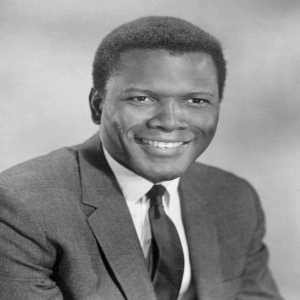Sidney Poitier KBE (/ˈpwɑːtjeɪ/ PWAH-tyay; February 20, 1927 – January 6, 2022) was a Bahamian and American actor, film director, and diplomat. In 1964, he was the first Black actor and first Bahamian to win the Academy Award for Best Actor. He received two competitive Golden Globe Awards, a BAFTA Award, and a Grammy Award as well as nominations for two Emmy Awards and a Tony Award. In 1999, he ranked among one of the "American Film Institute's 100 Stars". Poitier was one of the last surviving stars from the Golden Age of Hollywood cinema.
Poitier's family lived in the Bahamas, then still a Crown colony, but he was born in Miami, Florida, while they were visiting, which automatically granted him U.S. citizenship. He grew up in the Bahamas, but moved to Miami at age 15, and to New York City when he was 16. He joined the American Negro Theatre, landing his breakthrough film role as a high school student in the film Blackboard Jungle (1955). Poitier gained stardom for his leading roles in films such as The Defiant Ones (1958) for which he made history becoming the first African American to receive an Academy Award for Best Actor nomination. Additionally Poitier won the Silver Bear for Best Actor for his performance. In 1964, he won the Academy Award and the Golden Globe for Best Actor for Lilies of the Field (1963).
Poitier also received acclaim for Porgy and Bess (1959), A Raisin in the Sun (1961), and A Patch of Blue (1965), because of his strong roles as epic African American male characters. He continued to break ground in three successful 1967 films which dealt with issues of race and race relations: To Sir, with Love; Guess Who's Coming to Dinner, and In the Heat of the Night, the latter of which earned him Golden Globe and BAFTA Award nominations. In a poll the next year he was voted the US's top box-office star. Poitier also directed various films, including A Warm December (1973), Uptown Saturday Night (1974), and Stir Crazy (1980). He later starred in Shoot to Kill (1988) and Sneakers (1992).
Poitier was granted a knighthood by Queen Elizabeth II in 1974. He received numerous honors including the Golden Globe Cecil B. DeMille Award in 1982, the Kennedy Center Honor in 1995, Screen Actors Guild Life Achievement Award in 1999, and the Honorary Academy Award in 2002. In 2009, he was awarded the Presidential Medal of Freedom by President Barack Obama. In 2016, he was awarded the BAFTA Fellowship for outstanding lifetime achievement in film. From 1997 to 2007, he was the Bahamian Ambassador to Japan.
Early life
Sidney Poitier was born on February 20, 1927, in Miami, Florida. He was the youngest of seven children born to Evelyn (née Outten) and Reginald James Poitier, Afro-Bahamian farmers who owned a farm on Cat Island. The family would travel to Miami to sell tomatoes and other produce to wholesalers. His father also worked as a cab driver in Nassau. Poitier was born unexpectedly in Miami while his parents were there on business; his birth was two months premature, and he was not expected to survive, but his parents remained in Miami for three months to nurse him to health. Poitier grew up in the Bahamas, then a British Crown colony. His birth in the United States entitled him to US citizenship.
Although there were few Poitiers of French ancestry in the Bahamas, some believe that the Poitier ancestors had migrated from Haiti, and were probably among the runaway slaves who established maroon communities throughout the Bahamas, including Cat Island. There had, however, been one Poitier of French ancestry on Cat Island planter Charles Leonard Poitier, who had immigrated from Jamaica in the early 1800s, possibly originally from Haiti. In 1834, following the abolition of slavery, 86 slaves from his wife's estate kept the Poitier name.
Poitier lived with his family on Cat Island until he was ten, when they moved to Nassau. There he was exposed to the modern world, where he saw his first automobile and first experienced electricity, plumbing, refrigeration, and motion pictures. He was raised Catholic but later became an agnostic with views closer to deism.
At age fifteen, in 1942, he was sent to Miami to live with his brother's large family, but Poitier found it impossible to adjust to the racism in Jim Crow era Florida. At sixteen, he moved to New York City, looking to become an actor, holding a string of jobs as a dishwasher in the meantime. After failing his first audition with the American Negro Theatre due to his inability to fluently read the script, an elderly Jewish waiter sat with him every night for several weeks, helping him to improve his reading by using the newspaper. During World War II, in November 1943, he lied about his age (he was only 16 at the time) and enlisted in the Army. He was assigned to a Veteran's Administration hospital in Northport, New York, and was trained to work with psychiatric patients. Poitier became upset with how the hospital treated its patients and feigned mental illness to obtain a discharge. Poitier confessed to a psychiatrist that he was faking his condition, but the doctor was sympathetic and granted his discharge under Section VIII of Army regulation 615–360 in December 1944.
After leaving the Army, he worked as a dishwasher until a successful audition landed him a role in an American Negro Theatre production, the same company he failed his first audition with.
